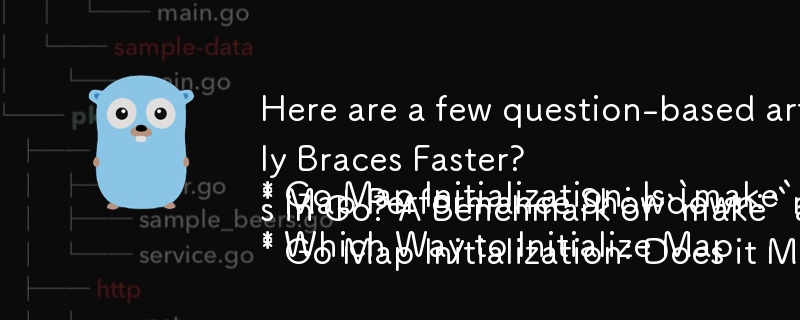

Performance Comparison of Map Initialization Methods in Go
When initializing maps in Golang, there are two common approaches: using make or curly braces {}. This article examines any potential performance differences between these methods.
Initialization with make
<code class="go">myMap = make(map[string]int)</code>
Initialization with Curly Braces
<code class="go">myMap = map[string]int{}</code>Performance Benchmarks
A benchmark was conducted to compare the performance of these two methods. The following code was used:
<code class="go">package bench
import "testing"
var result map[string]int
func BenchmarkMakeLiteral(b *testing.B) {
var m map[string]int
for n := 0; n < b.N; n++ {
m = InitMapLiteral()
}
result = m
}
func BenchmarkMakeMake(b *testing.B) {
var m map[string]int
for n := 0; n < b.N; n++ {
m = InitMapMake()
}
result = m
}
func InitMapLiteral() map[string]int {
return map[string]int{}
}
func InitMapMake() map[string]int {
return make(map[string]int)
}</code>Benchmark Results
Multiple benchmark runs yielded negligible performance differences between the two initialization methods. The results are close enough to be considered equivalent.
Conclusion
Based on the benchmark results, there is no significant performance difference between initializing maps using make or curly braces in Go. The choice between the two methods is a matter of personal preference or specific use case requirements.
The above is the detailed content of Here are a few question-based article titles that fit your article: * Go Map Initialization: Is `make` or Curly Braces Faster? * Map Performance Showdown: `make` vs. Curly Braces in Golang * Which W. For more information, please follow other related articles on the PHP Chinese website!
 How to create a new folder in webstorm
How to create a new folder in webstorm
 How to solve the problem that document.cookie cannot be obtained
How to solve the problem that document.cookie cannot be obtained
 How to read carriage return in java
How to read carriage return in java
 cad break line command
cad break line command
 Introduction to interface types
Introduction to interface types
 Is Yiouoky a legal software?
Is Yiouoky a legal software?
 What are the SEO keyword ranking tools?
What are the SEO keyword ranking tools?
 What to do if the computer fakes death
What to do if the computer fakes death




